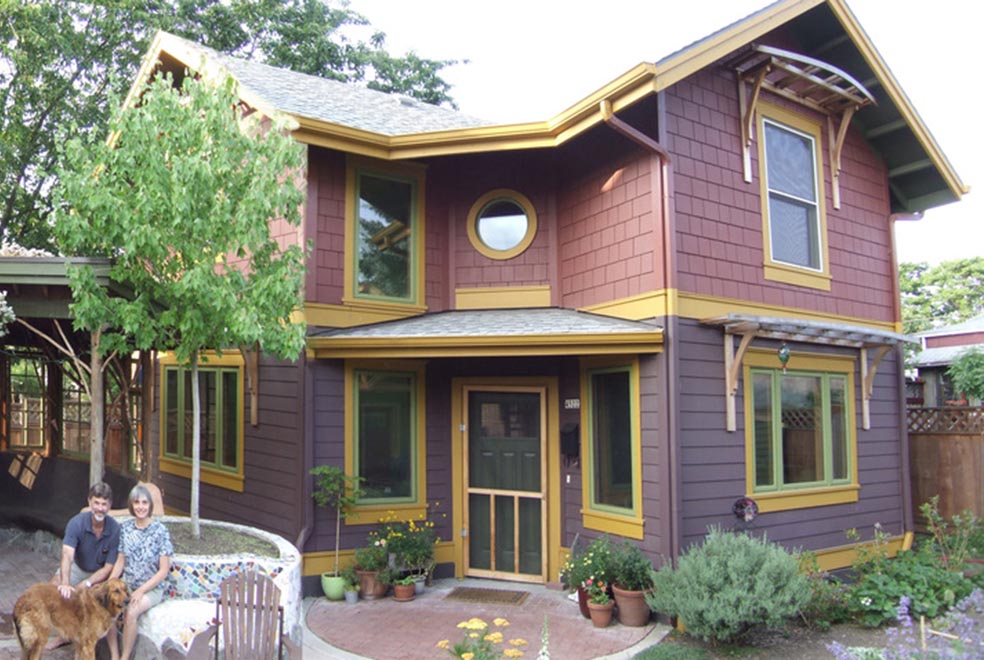[I originally wrote this article for the Communitecture blog, where I work as an architect.]
What do accessory dwelling units (ADU) have to do with Portland’s state of emergency for housing? Everything.
Accessory dwellings are the great compromise between adding density and preserving the single-family fabric that Portlanders have come to love and depend on. They are a great answer to adding housing options in the city without giving up much of the character that makes Portland what it is.
[Side Note for Those Not Familiar with ADUs:
What the heck is an accessory dwelling unit? It’s what a sounds like – a place to live in addition to a main house on a lot. It can be everything from a ground-up building in the yard, a basement level that’s been outfitted with a kitchen, bathroom and bedroom or an attached or detached garage that’s been buttoned up and tightened up so it’s insulated and weather tight and then outfitted with everything you need for a small apartment.]
There are lots of good reasons to build an ADU on your property if you are a homeowner. Here are the top 5:
1. Earning passive income to help pay your mortgage.
Perhaps the top reason to consider building an ADU is that it helps you leverage your property to earn passive income. It’s a way to rent part of your property to help pay your mortgage without disturbing your own household. Sometimes when an empty-nesting couple doesn’t need a big house anymore, they will build and move into an ADU while renting the main house out to another family, earning income from the rental and minimizing their own costs by living in a smaller space. An emerging use for ADUs is Air BnB or vacation rental. This can be a boon of income for those who feel stretched in paying their monthly mortgage.
2. Changes in your family situation.
Another name for ADUs is the mother-in-law suite. As parents age and want to live close to their grown kids and grandkids, ADUs can be a heaven-sent solution to provide just the right combination of separation and togetherness that works for a lot of intergenerational family living. Do you have a teenager in the house that’s dying for more independence? A basement accessory dwelling unit or an attached garage conversion may be a workable option to manage this difficult situation by providing the feeling of independence that your teenager needs without taking her too far away from your caring supervision. ADUs are also a good option in the event that your child moves back home for some time. There are lots of family situations that are greatly helped by ADUs, these are just some.
3. Aging in place.
ADUs are an excellent tool for aging in place. As I mentioned before, an ADU can serve as a transition from a big house to a smaller, more manageable space for empty-nesters and aging couples. It can also make for a caregiver suite in the event you may need one. The caregiver could be a professional caregiver or even a family member, or a close friend.
4. Creating Community.
As you can see from reasons 1-3, ADUs create instant community, because they allow for a variety of togetherness situations that aren’t possible in one house alone. Sharing your property with another person is a good way to share the duties of yard maintenance or to create an amazing homestead. Want to keep chickens and start a vegetable garden but just don’t have the time to do it by yourself? Having a like-minded ADU tenant could provide the perfect partner to create things that would be too difficult to do on your own. ADUs are also a great way to craft family if you are a single person, where a tenant can be a sort of partner in a household.
5. Helping to add housing options for people.
There is a housing crisis in Portland because there simply isn’t enough affordable housing stock in desirable areas for the number of people who want to live here. ADUs add options for people in three ways – cost, size and neighborhood. ADUs provide an option to people who can’t afford to buy in established and expensive neighborhoods to live there by renting. Also, because ADUs can’t be bigger than 800 square feet by code, they provide an affordable type of housing that works for a large number of people who don’t need a lot of space.
Bonus: It’s good for the environment.
If you are converting a basement to an ADU, this helps the environment by reducing the carbon footprint of your house because more people are benefitting from the same building envelope. Same thing goes for an attached or detached garage. Even a ground-up ADU is good for the environment because it provides people with a compact living situation that is energy efficient, water efficient and materials-efficient simply because of it’s small size.
Want to learn more about ADUs and keep abreast of the latest codes and regulations affecting them? Check out this excellent and always up to date resource – Accessory Dwellings – by Portland’s foremost ADU experts Kol Peterson, Martin Brown and Eli Spevak.
Also, you may be interested in the upcoming 2015 Build Small Live Large Summit on Friday November 6, 2015. It will be held at the PSU Smith Center. The summit will cover topics like ADUs, cluster cottages and small house communities, space-efficient design strategies, and much more. You can register here.
Important notice: Right now is the best time to get started on building an ADU because the City’s waiver on systems development fees on ADUs expires on July 1, 2016. That means you have to get your ADU permitted by the city by July 1 next year to take advantage of the fee waiver. Click here for more information.
Photo: Sabin Green ADU designed by Communitecture, developed by Orange Splot.

















